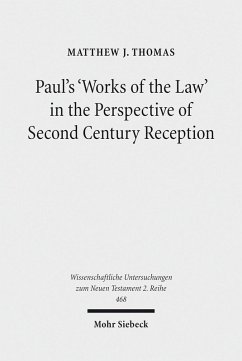Paul writes that we are justified by faith apart from 'works of the law', a disputed term that represents a fault line between 'old' and 'new' perspectives on Paul. Was the Apostle reacting against the Jews' good works done to earn salvation, or the Mosaic Law's practices that identified the Jewish people? Matthew J. Thomas examines how Paul's second century readers understood these points in conflict, how they relate to 'old' and 'new' perspectives, and what their collective witness suggests about the Apostle's own meaning. Surprisingly, these early witnesses align closely with the 'new' perspective, though their reasoning often differs from both viewpoints. They suggest that Paul opposes these works neither due to moralism, nor primarily for experiential or social reasons, but because the promised new law and covenant, which are transformative and universal in scope, have come in Christ. This work was named 'Jesus Creed Book of the Year 2018' on Scot McKnight's Jesus Creed blog. 'Thomas's work on second-century interpreters is a significant contribution to reception or effective-history in general and certainly will have a transformative effect on the character of contemporary interpretation of Paul's texts.' Timothy Gombis in Bulletin for Biblical Research Vol. 29, No. 4, 2019 BA, Pepperdine University; MCS, Regent College; D.Phil, University of Oxford; currently Assistant Professor of Biblical Studies at the Dominican School of Philosophy and Theology in Berkeley, CA.
Dieser Download kann aus rechtlichen Gründen nur mit Rechnungsadresse in A, B, BG, CY, CZ, D, DK, EW, E, FIN, F, GR, HR, H, IRL, I, LT, L, LR, M, NL, PL, P, R, S, SLO, SK ausgeliefert werden.


